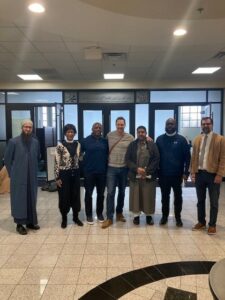Dear all,
On Saturday evening, some members of the congregation gathered in the church as the day’s light fell. It wasn’t fully dark yet at 7 pm – more of a thick, expectant gloom. There were young children and older people; members of youth group, Confirmation class, and the Connections Choir. Everyone received a candle when they entered. In the quiet, we waited.
Then, fire.
David lit the Paschal flame, the new fire of Easter, resting in a bowl on the floor in front of the altar. From that flame he lit the Paschal Candle, the light that shines throughout the Easter season and during baptisms and funerals, reminding us of the resurrection that shines light and new life even through death. From the Paschal Candle we lit our own small candles, and shared the light with the congregation until the church was glowing with the light of Christ that shines in each of us.

In the glow, we listened to stories from scripture and the words of prayers that told our own story – of our salvation, our redemption, our new life in Christ. We renewed our vows to that life, committing again to all that God’s love calls forth from us, and vowed to support all those being baptized do the same. And then we welcomed five members of our parish youth, from second grade to twelfth grade, into that new life in Christ by water and the Spirit in Holy Baptism.
The Easter Vigil was and is a powerful illustration of Cristina’s sermon from Sunday morning. Resurrection starts in the dark – new life starts in the dark. There in the dim and glowing sanctuary, there in the darkening gloom, we sought that new life. We looked for the resurrection. Only after the time in the dark did we find it, first with the lighting of the Paschal flame, then with the lighting of the Paschal Candle, and the passing of light from person to person. And only after all our own lights were shining did light fully break in the church when we threw on lights with our cries of “Alleluia, Christ is risen!” “The Lord is risen indeed, Alleluia!” after the baptisms were concluded.
When I find myself in the gloom, down deep, where resurrection or redemption feel too far to hope for, it is the little lights I try to look for. There are times when the pain of this world – the human suffering we cause, the intentional and unintentional damage to one another and the planet, the systems of sin with which we are entangled, the personal griefs that weigh us down – feel so large and overwhelming that they appear insurmountable. The joyful noise and bright lights of the Easter proclamation seem far away. In those moments, I try to look for the little lights, the ones held by the people around me, warm and glowing. We each have one, whether we are at the Vigil or not. A kindness, a gesture, a friendship, a smile. They are reminders of the indwelling of the Spirit and God’s eternal love, here among us and within us, even in the gloom, even deep down. This Eastertide, may we carry with us those little lights, for ourselves and for the world.
Love,
Rebecca+

 our meeting, Shaykh Yaseen Shaikh gave several of us a tour, which included popping in on the young students at their Al-Ramah School. One of them led the call to prayer for the community; another chanted from memory a portion of the Qu’ran.
our meeting, Shaykh Yaseen Shaikh gave several of us a tour, which included popping in on the young students at their Al-Ramah School. One of them led the call to prayer for the community; another chanted from memory a portion of the Qu’ran.